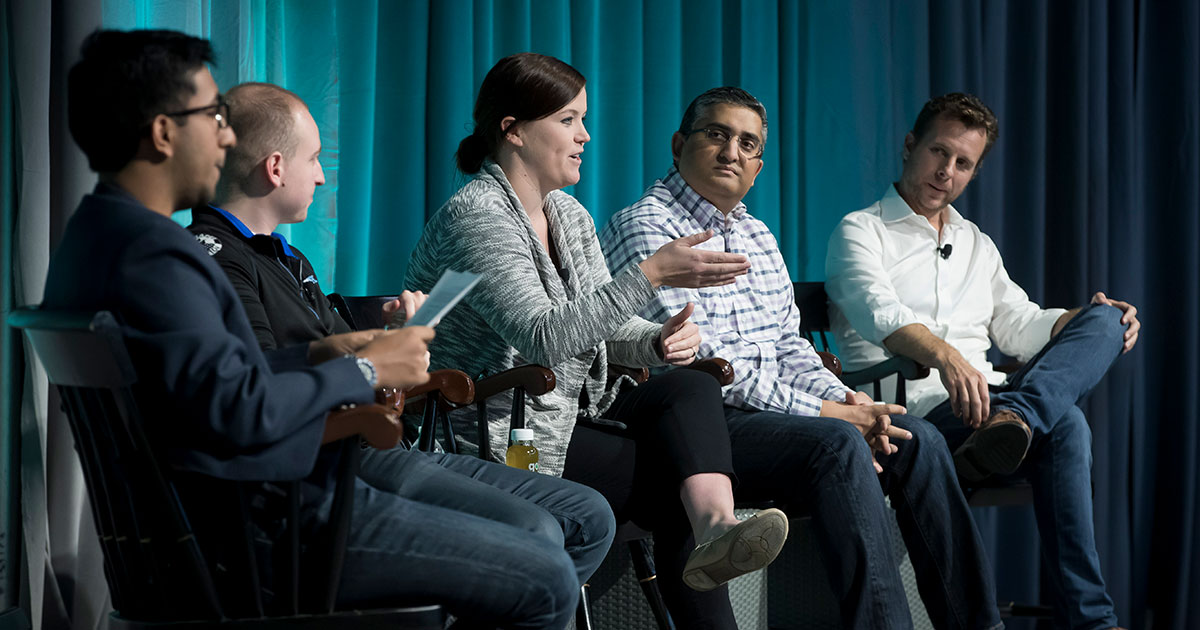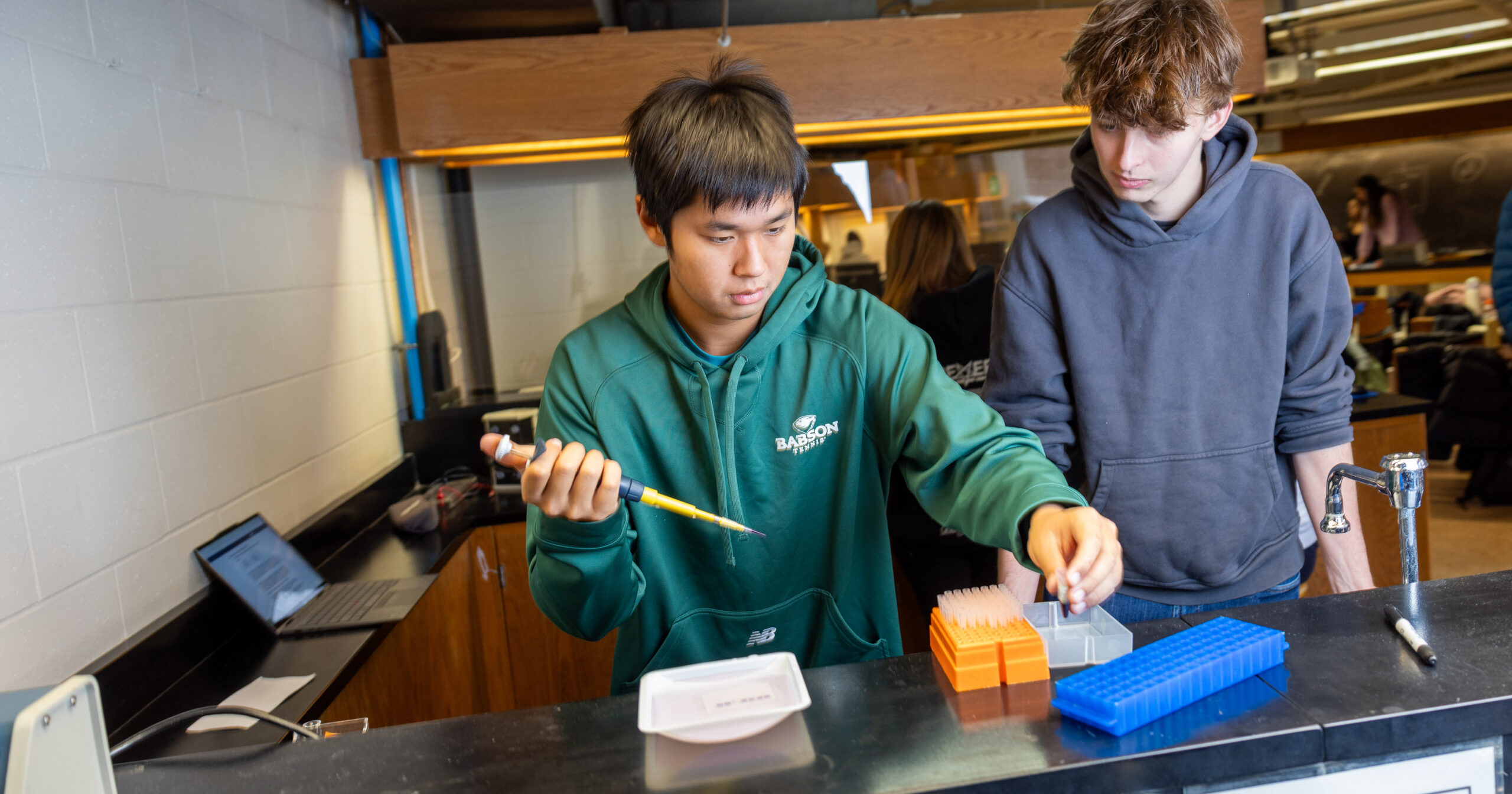Alumni Who Pitched Ideas on ‘Shark Tank’ Return to Babson

By now, you probably know that a number of Babson students and alumni have pitched their ideas and products on ABC’s “Shark Tank.”
This month, four of those alumni returned to campus for Babson Connect: Worldwide, part of the College’s Centennial Celebration, to share their entrepreneurial experience in a panel on “Swimming with Sharks”.
A Pitch Prepared by Babson
A native of England, Sanjiv Patel MBA’02 grew up in a business family, and after a few brief years of working as an accountant, came to Babson to earn his MBA.
After graduating, he was named director of finance (CFO) of Stacy’s Pita Chips, where he helped grow the company’s sales from $2 million to $60 million over about four years.
The company was later sold to Frito Lay, and Patel started his own business; Lord Nut Levington Gourmet Peanuts, featuring several different varieties of highly seasoned nuts, including flavors like zesty chili lime, white cheddar & jalapeno, and dill pickle ranch.
Patel pitched the idea on “Shark Tank” in season five. Though he didn’t receive an offer, he remembers the appearance fondly.
“I look at it is a great life experience,” Patel said. “We’re all looking for things that help us stand out from the crowd.”
While Patel found the moment nerve-wracking, he credited his Babson education with preparing him for the pitch.
“Once I got on set and started talking, then your MBA kicks in,” Patel said. “For us to present a business case is second nature by the time you’ve gone through the program.”
During the panel, Patel shared that the opportunity “didn’t set in until it was over. There was so much going on, and then, you can’t tell anyone! I sat there on the plane on the way home thinking, ‘I want to tell all of you what just happened!'”
Patel said the appearance offered exposure for the business, and he frequently mentioned the show when conducting future sales pitches.
Lord Nut was sold in about 2,000 stores at its peak, including retailers such as Target and Stop & Shop. Patel closed the business last year and currently works as a consultant.
“I lost the war but I won a lot of battles,” he said. “A lot of successful people have had many failures.
“The odds are against you, you’ve got to stand out,” he advised of his “Shark Tank” appearance. “Your product has got to be interesting, you’ve got to be interesting, you’ve got to be memorable. That’s the most important thing.”
Building a Trusted Company
While pursuing her MBA at Babson, Abby Speicher MBA’15 was brainstorming ideas to start a business.
Her father, an avid fan of drones, encouraged her to explore the budding industry. After winning two business plan competitions that came with prize money and an office space, Speicher established and began to grow DARTdrones, a drone training and consulting firm.
DARTdrones helps companies design programs for drone use, determine which equipment they need, and conduct training. It also trains in aerial search and rescue, mapping and modeling, and thermal imaging, and helps applicants acquire their Federal Aviation Administration pilot certificate.
Speicher had the idea to apply to “Shark Tank” while participating in Babson’s Summer Venture Program. She appeared on season eight, and received an offer during her pitch.
“It taught me a lot about trying to be brave and make sure that I was prepared,” Speicher said of her appearance.
“Right after I got the deal, I could not believe it was all happening.” At that time, she said, “that was probably my only bucket list item. Then, it was like, what now?”
Speicher said the appearance opened the company to opportunities with larger clients, such as NASA, the FBI, CNN, and hundreds of police and fire departments.
“Everybody in drones is brand new,” Speicher said, raising how some observers remain skeptical of the industry. “Being on “Shark Tank” changed that immediately for us, that we were a trusted, credible company.”
Transforming a Business Overnight
David Zamarin’s quest to appear on “Shark Tank” started four years before he stepped in front of the judges.
At age 15, he emailed Mark Cuban seeking business advice. When Cuban responded, Zamarin ’19 inquired about going on the show.
Cuban did not reply due to a rule prohibiting contact between judges and contestants prior to an appearance, but instead instructed a producer to follow Zamarin in the ensuing years and encourage him to apply when ready.
In 2013, Zamarin founded DetraPel, a non-toxic product that can be applied as spray to fabric and repel liquid-based substances. He established the business after researching and discovering companies were selling similar products that were carcinogenic.
He pitched DetraPel in season nine of “Shark Tank” and received offers from four of five “sharks.”
“The experience was incredible,” Zamarin said. “It changed the business overnight.”
DetraPel made more than $300,000 in sales in the days following the appearance. The company also doubled its employees and moved to a new facility three times its previous size.
“I knew what I was doing was something that was worth it,” Zamarin said. “As a young person, that was a big motivator. Having that validation brought confidence, not to me personally, but the business as a whole.”
At the end of his appearance in a scene that did not air, Zamarin offered a friendly reminder to Cuban of their email exchange.
“My sign-off was that ‘I wouldn’t have been here if you didn’t check your email four years ago,’” Zamarin said.
Amazon’s Big Acquisition
Ring founder Jamie Siminoff ’99 appeared on “Shark Tank” in 2013, in an appearance what is now remembered as “the billion-dollar idea that got away.”
“I do remember the most joyful part of the whole thing…” shared Siminoff. “I paused, looked around, and realized I was on ‘Shark Tank’.’ He later noted that, ‘”Shark Tank’ is to entrepreneurs the equivalent of going to the Olympics as an amateur athlete.”
He didn’t receive any offers when he pitched Ring, the video doorbell that lets homeowners answer their door remotely using a smartphone. But, in 2018, Amazon purchased Ring in a $1 billion deal, the second-largest Amazon acquisition after Whole Foods.
Siminoff has been recognized by Babson as a Rising Star and has been a featured speaker at college events.




